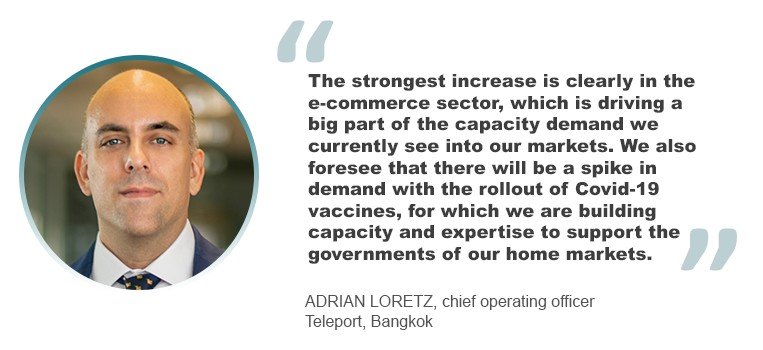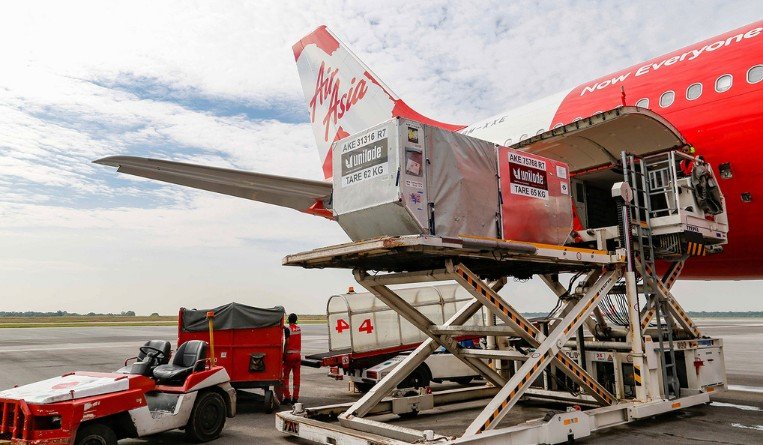AirAsia, through its logistics venture Teleport, is pursuing its rollout of a 24-hour delivery service across its network in Southeast Asia, banking on its parent company’s extensive network in the region.
Adrian Loretz, the Bangkok-based COO of Teleport, said despite the disruptions of the Covid-19 pandemic, Teleport has made great strides in setting-up the infrastructure for its planned next-day delivery service, which the company earlier targeted to roll out this year.

As part of this effort, Teleport already launched late last year a last-mile delivery service in 77 cities across Southeast Asia from Thailand to Indonesia, Malaysia and Singapore and the Philippines, and is currently building its fleet further to fulfill the growing demand.
“Despite the ongoing lockdown and rising cases of Covid, we have been working steadily towards this goal,” Loretz told Asia Cargo News.
Loretz added that the firm also recently received its license to handle customs clearance in Malaysia with other countries to follow shortly, aimed towards its goal to deliver within 24 hours anywhere in Southeast Asia.
“Our strategy remains very much focused on this goal. With the restart of our cargo-only network at the end of 2020, which reconnects our core markets with cargo-only flights, we have reestablished a crucial part of this strategy,” Loretz said.
AirAsia’s cargo-only network now connects markets in China, South Korea and India with Malaysia and Thailand on a regular basis, and the network is “only getting denser as we move forward,” Loretz said. He also noted that Teleport was able to connect its cross-border flights to Indonesia and the Philippines where “demands are increasing.”
Additional freighters to increase capacity
Moving forward, AirAsia’s Teleport is looking to add more dedicated freighter capacity, which will help expand the logistic firm’s reach to areas not yet served by its passenger flights.
Loretz said currently, Teleport uses a dedicated fleet of two Airbus A320 and two to three A330 to operate these routes, using cabin loading on seats.
“We are currently under negotiations to add additional dedicated freighter capacity, which will further help us to create capacity in high-demand markets which are not yet connected again by passenger flights,” Loretz told Asia Cargo News.
“As we are expecting borders to gradually open again later this year, we will be able to combine our belly space with our dedicated cargo network, which will be a further step to reach any station in the network within the next day,” he added.
E-commerce, vaccines in focus
Teleport noted that after an initial peak on PPE shipments across the globe, the firm is now seeing a return to the usual air cargo goods, such as perishables and general cargo, with strong growth in e-commerce shipments.
“The strongest increase is clearly in the e-commerce sector, which is driving a big part of the capacity demand we currently see into our markets,” Loretz said. “We also foresee that there will be a spike in demand with the rollout of Covid-19 vaccines, for which we are building capacity and expertise to support the governments of our home markets.”
Loretz noted that the e-commerce boom has been further accelerated by prolonged lockdowns, resulting in changing customer behaviours for making purchases online.
“About 50 to 60% of our current cargo volumes are courier shipments. With the strong demand of courier shipments, we also launched flights just to capture this demand, especially for flights from China,” he said.
But while e-commerce currently “helps fill” its flights, Loretz noted that in the long run, Teleport is also looking to offer integrated solutions, not only belly space.
“Our strategy is clearly to look beyond airfreight only but to offer a last-mile solution as well,” he added.
Compared to 2020 volumes, Loretz noted that volumes in Southeast Asia are yet to return to pre-COVID levels. He said the drop in volumes, however, is mainly due to capacity constraints with a slowdown in passenger flights.
“In some of our core markets, like Indonesia and the Philippines, the domestic cargo tonnage has returned to pre-Covid levels and, in some places, we are even exceeding it,” Loretz added.
In the course of the pandemic, he noted that most of the “quick actions” needed to adapt to the new normal include quickly refocusing its business to “new opportunities outside of airfreight.”
“The reason for us branching out from more than just a cargo industry is because we want to use our infrastructure to help e-commerce grow in Southeast Asia and to solve the pain points of an end-to-end infrastructure which goes beyond just the traditional air cargo,” Loretz earlier told Asia Cargo News.
Meanwhile, AirAsia and Teleport are also expected to participate in the Covid-19 vaccine delivery, given the low cost carrier’s extensive network in Asia.
“With the rollouts of the Covid-19 vaccines, we are ready and committed to focusing operations to support the distribution of vaccines in the region,” Loretz said.
Charlee C. Delavin



